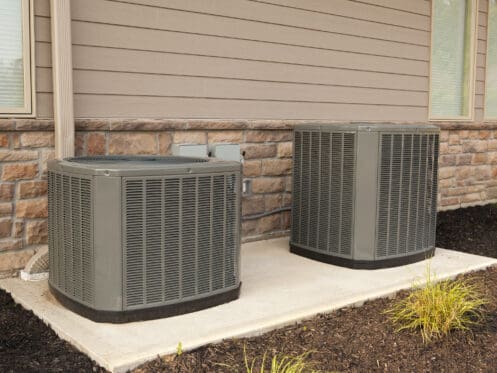Making the switch from an air conditioner (AC) to a heat pump can dramatically improve the energy efficiency of your home’s cooling and heating systems. This change also has the potential to reduce energy costs while enhancing your home’s year-round comfort. However, making the switch requires careful thought and consideration. To help you make a successful transition from an AC to a heat pump, we’ve put together a helpful guide on the top three reasons to make the switch and five ways to get the most out of your installation.
3 Reasons to Replace the AC With a Heat Pump
If you’re trying to decide whether to replace your AC with a heat pump, ask yourself a few questions. If you answer yes to any of them, you may find it cost-effective to go ahead with the replacement.
1. Is My AC Old and Out of Date?
Air conditioners, according to most experts, have a lifespan of 15 to 20 years, and this is particularly true in the northern United States, such as New Jersey, where cooling the house isn’t necessary for all but a few months of the year. With this in mind, you should probably wait until your current air conditioner is at least seven to 10 years old before upgrading to a heat pump. However, if it’s past the seven- to 10-year mark, replacing it with a heat pump is a cost-effective way to make your home more energy efficient.
2. Am I Spending Too Much On Repairs?
Although occasional AC maintenance is normal, recurring issues should raise red flags because of the cost and inconvenience they cause. For the first five to 10 years after purchasing and installing a high-quality AC, you shouldn’t have to spend much money on maintenance. When you find yourself constantly dishing out money for repairs, replacing the air conditioner with a heat pump might prove far more cost-efficient when compared to paying for the ongoing maintenance costs associated with keeping your AC going.
3. Do I Want to Take Advantage of Tax Credits and Incentives?
Installing a heat pump system may help you qualify for a variety of tax credits, as well as refunds, municipal promotions, and payment options. Refreshing yourself on the latest incentives is an easy way to put money back into your pocket.
Tax credits of up to $2,000 are available to homeowners who install qualified heat pumps in 2023 under the terms of the Inflation Reduction Act. Some cities and governments have already begun prohibiting the use of natural gas in the construction of new buildings, and this incentive coincides with those laws.
In addition, several utility providers provide financial incentives to customers who switch to electric heating systems. Contact First Choice Plumbing, Heating & Air Conditioning to learn about the many heat pump incentives available to New Jersey residents.
5 Tips for Replacing the AC With a New Heat Pump
Heat pumps are a great alternative to air conditioners because they can effectively heat and cool a home throughout the entire year. Here are five tips to help you optimize the performance of your new heat pump.
1. Choose the Correct Size
Choosing the correct size for a heat pump is critical for achieving peak efficiency and performance. Undersized heat pumps can’t keep your house warm during cold New Jersey winters, while oversized units do nothing more than waste energy and leave behind hot and cold spots. Here at First Choice Plumbing, Heating & Air Conditioning, one of our qualified technicians can determine your home’s heating and cooling loads and then size the heat pump accordingly.
2. Choose the Right Type
Experts classify heat pumps as air-source, ground-source, or water-to-air. Your home’s needs and the area’s typical climate determine which type of heat pump is best for your home. You can also contact us to learn more about choosing the right type for your house.
Water-to-air heat pumps convert thermal energy from water instead of air. Their efficiency often exceeds that of devices powered by the ground or the air because water is a more efficient conductor of heat, and in the winter, the water is warmer than the air and the land.
Air-source heat pumps are more common and cost-effective than ground-source ones, but they’re less efficient. While the initial installation expense for a ground-source heat pump is higher due to the requirement for horizontally excavated or vertically drilled ground loops, this type is more efficient and can lead to monthly energy savings for homeowners.
3. Pick a Professional Installer
For a heat pump to achieve optimum performance and energy efficiency, correct installation is necessary. Vital processes performed during the installation include aligning the heat pump, attaching the coolant lines, and charging the system.
It’s also important to remember that conventional thermostats are incompatible with heat pumps, so you’ll have to replace yours with a heat pump-specific one that works with your system’s coolant lines and wiring. Installing anything incorrectly might cause performance issues and waste energy. That’s why it’s crucial to get an expert to do the installation for you.
4. Ask the Installer for Maintenance Instructions
Effective heat pump use and maintenance are things homeowners should familiarize themselves with. Heat pumps require ongoing maintenance, just like regular air conditioners do. However, heat pump maintenance is minimal compared to regular AC maintenance.
The contractor that installs your heat pump will likely provide you with a paper detailing the maintenance requirements. If not, make sure to ask how to take care of your specific model. Debris-free zones surrounding the outside unit, being conservative with temperature adjustments (particularly in the heating season), and annual maintenance inspections all contribute to the optimal performance and service life of your heat pump.
5. Consider New Technologies
Over the last decade, the field of heating and cooling technology has experienced substantial growth. When you hire First Choice Plumbing, Heating & Air Conditioning to perform a heat pump installation, we’ll tell you all about the new variable speed and two-stage technologies that you can use in your home to improve its comfort level.
A heat pump with two-stage technology includes a compressor that can switch between high and low speeds, one for use on very hot days and the other for use on cooler ones. When compared to single-stage heat pumps, the two-stage technology is more effective and can dehumidify a room twice as quickly. In addition, two-stage heat pumps maintain a low level of operation virtually continuously, as opposed to providing full heat output for just a few hours at a time.
Variable-speed heat pumps have the ability to operate at a wide range of capacities by adjusting their motor speeds in tiny increments. They’re accurate to within 0.5 degrees, allowing you to maintain an extremely comfortable temperature in your house. When compared to single- and two-stage heat pumps, they are much quieter and achieve higher rates of energy efficiency.
Book a Heat Pump Installation Today
When it comes to selecting a heat pump for your house, you can trust that all of our professionals have the experience and education necessary to guide you in the right direction. In addition to heat pump installation and other heating and cooling services, we provide skilled plumbing services, such as repiping, maintenance, and repair for sump pumps and toilets and the installation of garbage disposals. Get in touch with First Choice Plumbing, Heating & Air Conditioning right away to speak with a representative about the most cutting-edge heating and cooling technologies available in Metuchen, NJ and the surrounding area, as well as other factors to think about before switching out your AC for a heat pump.




